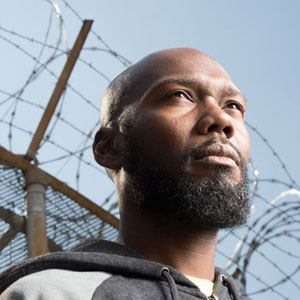Arlando Jones was the son of a father he never knew and a mother whose year of death he’s unsure of. His Aunt Kim acted as a surrogate parent, though her heroin addiction proved her a poor substitute. By age 12, Tray, as he was known, was running the street corners of 1980s East Baltimore, selling crack cocaine and marshaling his forces, all the while steadily accumulating money, gaudy jewelry and respect.
“The neighborhood was embracing us. The girls were adoring us, and the police took notice of us, although they did not bother us,” Tray writes in his memoir, “Eager Street: A Life on the Corner and Behind Bars.” He and his fellow dealers and gangbangers were “empowered.” Many of them junior high and high school dropouts, for the first time they “belonged to something that awarded us esteem.”
And then, Tray’s life ended. He wasn’t killed. But when he was 16, he was serving the first year of a life sentence in Maryland’s prison system, doing time for a murder he maintains he didn’t commit.
A little more than a decade later, the Open Society Institute set up its first — and, to this day, only — field office dedicated to societal reforms in a single city. On Oct. 29, OSI-Baltimore celebrated 15 years as an office with Big Change Baltimore, an event that in TED Talk-style brought together a group of local and national speakers, united around two ideas, equity and inclusion, and three topics:
- education
- addiction
- criminal justice
Those three topics, each of which influenced young Tray’s life in its own, insidious way, have been a main focus, albeit not a sole one, of OSI-Baltimore’s progressive reform and grant-making efforts in this city since 1998. A dozen speakers took their turn at the microphone — a lineup that included Baltimore Ravens president Dick Cass, Center For Urban Families founder Joe Jones and NAACP Legal Defense and Educational Fund director-counsel Sherrilyn Ifill — heralding Baltimore for the progress it has made since OSI-Baltimore’s inception in 1998, and presenting ideas for the city to keep improving.
Through those presentations, the way in which OSI-Baltimore has organized its continuing efforts here was laid bare: through partnerships. Or, to borrow the phrasing of Big Change speaker and former U.S. Department of Housing and Urban Development Secretary Henry Cisneros: through “venues of collaboration.”
It was OSI in this city, as Big Change Baltimore attendees learned at Center Stage on Tuesday, that spearheaded school suspension reform in conjunction with Baltimore City Public Schools, bringing 26,000 suspensions of students in 2004 down to 8,000 by 2010. It was OSI, in 2012, that threw its weight behind cycling safety by funding Chris Merriam, one of its community fellows and the founder of nonprofit Bikemore. And it was OSI that, through writings on its website and assisting the Core Alliance of Youth Leaders of Community Law in Action, joined forces with many others to successfully dissuade the state and city from constructing a $70 million, 120-bed juvenile jail facility in East Baltimore.
By seeking out and teaming up with active partners already doing the type of advocacy work that OSI-Baltimore supports, the organization was able to amplify its own efforts.
But rather than the institutions or top-down “venues of collaboration,” it’s the efforts of community groups that seem to often do the best work. For example, the sorts of community groups that OSI-Baltimore cheers on and supports have kept one rec center open next to Liberty Elementary School, with hopes of more.
In other words, as 2012 OSI-Baltimore community fellow Bashi Rose put it during his spoken word performance that kicked off the second of three sessions Tuesday: if significant change is going to happen in Baltimore, “then it has to start from the grassroots, up.”
Tray, now in his 40s, is a proud man, the sort who has said multiple times that he won’t absolve himself for the path he chose that led him to prison. But he also once told this reporter that if he “wasn’t a child abandoned by society, then there’s no such thing.” Schools suspended him. Juvenile detention center employees didn’t care about him. He was raised by the stop sign, as the Wale song describes it.
“Someone should’ve told me that I was worth far more than the value I attributed to myself,” he said.
On a Tuesday afternoon at Center Stage, there was a room full of people capable.
So mark 15 years of work. Given OSI-Baltimore’s track record — and those leaders at the grassroots it has funded time and again — such observance is well deserved.
But now is the time to fill a room of people who have likely never met. Which more than likely means finding the Tray Joneses of this city that would like a seat.
Join the conversation!
Find news, events, jobs and people who share your interests on Technical.ly's open community Slack

Baltimore daily roundup: Gen AI's software dev skills; UpSurge Tech Ecosystem Report; MD service year program

Baltimore daily roundup: Mayoral candidates talk tech and biz; a guide to greentech vocabulary; a Dutch delegation's visit

Baltimore daily roundup: Medtech made in Baltimore; Sen. Sanders visits Morgan State; Humane Ai review debate



